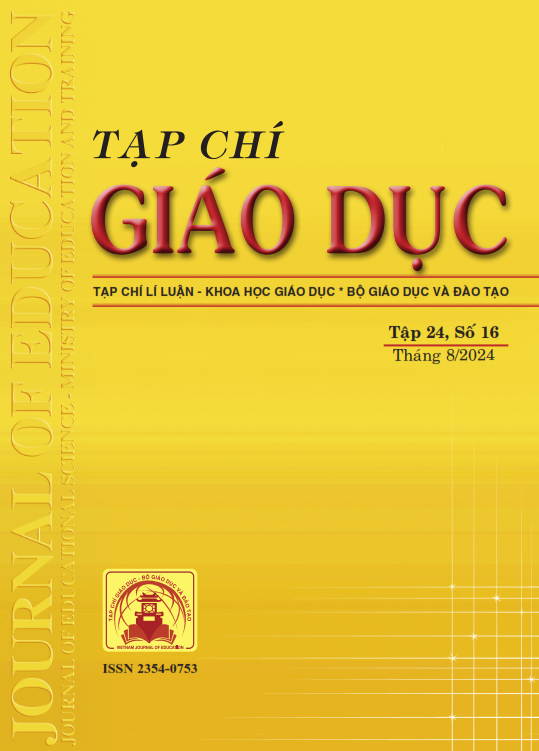Hạnh phúc tâm lí của người trưởng thành trẻ tuổi: Nghiên cứu tại Thành phố Hồ Chí Minh
Tóm tắt
Happiness is a research topic that has been of interest to humans since very early times, with origins from the Greek philosopher Aristotle. In this study, the researcher focuses on understanding happiness from the perspective of psychological science. Specifically, 660 young adults were surveyed on their level of wellbeing using Carol Ryff's 42-question Psychological Well-Being Scale, adapted to the context of Vietnam. The research results show that the level of psychological well-being in the surveyed young adults was at an average level (M = 3.61; SD = 0.5). The study also shows that there are differences in well-being in gender, religious beliefs, educational level, personal income and marital status in young adults and there is a correlation between general psychological well-being and 6 dimensions of psychological well-being in young adulthood.
Tài liệu tham khảo
Anglim, J., & Horwood, S. (2021). Effect of the COVID-19 pandemic and big five personality on subjective and psychological well-being. Social Psychological and Personality Science, 12(8), 1527-1537.
Arslan, G., & Allen, K. A. (2022). Exploring the association between coronavirus stress, meaning in life, psychological flexibility, and subjective well-being. Psychology, Health & Medicine, 27(4), 803-814.
Chen, F. F., Jing, Y., Hayes, A., & Lee, J. M. (2013). Two concepts or two approaches? A bifactor analysis of psychological and subjective well-being. Journal of Happiness Studies, 14, 1033-1068.
Đặng Hoàng Ngân (2017). Ảnh hưởng của tiêu điểm kiểm soát đến cảm nhận hạnh phúc của sinh viên. Luận án tiến sĩ Tâm lí học, Trường Đại học Khoa học Xã hội và Nhân văn - Đại học Quốc gia Hà Nội.
Đặng Hoàng Ngân (2019). Ảnh hưởng của tiêu điểm kiểm soát đến cảm nhận hạnh phúc của sinh viên. Luận án tiến sĩ Tâm lí học, Trường Đại học Khoa học Xã hội và Nhân văn - Đại học Quốc gia Hà Nội.
Hang, N. T. M., & Ngan, D. H. (2017). Buddhist Non-Attachment Philosophy and Psychological Well-Being In Vietnamese Buddhists. European Proceedings of Social and Behavioural Sciences, 119-134. http://dx.doi.org/10.15405/ epsbs.2017.01.02.14
Hồ Khai Tâm (2022). Mối liên hệ giữa buông xả (non-attachment) và hạnh phúc tâm lí của người trưởng thành trẻ tuổi. Luận văn thạc sĩ Tâm lí học, Trường Đại học Sư phạm Thành phố Hồ Chí Minh.
Hồ Tâm Đan (2019). Cảm nhận hạnh phúc của người làm tham vấn tâm lí tại Thành phố Hồ Chí Minh. Luận văn thạc sĩ Tâm lí học, Trường Đại học Sư phạm Thành phố Hồ Chí Minh.
Kiều Thị Thanh Trà (2018). Psychological well-being of student in Ho Chi Minh city. Kỉ yếu Hội thảo khoa học quốc tế Tâm lí học học đường lần thứ 6 (tr 93-99). NXB Đại học Sư phạm.
Negovan, V. (2010). Dimensions of students’ psychosocial well-being and their measurement: Validation of a students’ Psychosocial Well Being Inventory. Europe’s Journal of Psychology, 6(2), 85-104.
Nguyễn Lân (2000). Từ điển Từ và Ngữ Việt Nam. NXB Tổng hợp Thành phố Hồ Chí Minh.
Nguyễn Minh Quân (2020). Mối quan hệ giữa giá trị bản thân và hạnh phúc tâm lí của sinh viên. Luận văn thạc sĩ Tâm lí học, Trường Đại học Sư phạm Thành phố Hồ Chí Minh.
Nguyễn Thị Uyên (2022). Những yếu tố ảnh hưởng đến cảm nhận hạnh phúc của học sinh trung học phổ thông thành phố Sơn La. Luận văn thạc sĩ Tâm lí học, Trường Đại học Khoa học Xã hội và Nhân văn - Đại học Quốc gia Hà Nội.
Phạm Mạnh Hà (2018). Sống tự lập - Sự chọn lựa của giới trẻ ngày nay. https://vtv.vn/doi-song/song-tu-lap-su-chon-lua-cua-gioi-tre-ngay-nay-20181008193321044.htm
Ryff, C. D. (1989). Happiness Is Everything, or Is It? Explorations on the Meaning of Psychological Well-Being. Journal of Personality and Social Psychology, 57(6), 1069-1081.
Tải xuống
Đã Xuất bản
Cách trích dẫn
Số
Chuyên mục
Giấy phép

Tác phẩm này được cấp phép theo Ghi nhận tác giả của Creative Commons Giấy phép quốc tế 4.0 .












